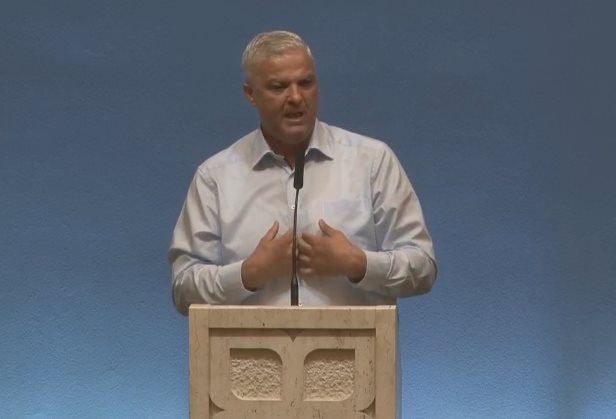
The Gospel Demands Radical Sacrifice – Read the notes from entire sermon below the video. Here is an outline of the sermon:
The Sacrifice of a Christian Luke 14:25-35
Term #1 – Jesus requires superior love
Term # 2 – Jesus requires exclusive loyalty
- Through the cross of Christ we die to the life we live
- This changes our priorities
- We are workers constructing a building
- We are warriors fighting a battle
Term # 3 – Jesus requires total loss
- For the cause of Christ we give up everything we have
- This changes our possessions
Jesus is supremely loving
Jesus is supremely loyal
Jesus sacrificed the supreme loss
We’ve created a system of Christianity that consists in a bunch of boxes to check off. The danger is, we hear the Word and … “Tell me what I’m supposed to do?” And we crave boxes. If we could just check these things off , it would be ok. That’s not the point. It misses the point altogether. That’s a Christianity that consists of external regulations that bypasses the heart. I believe the point is for God to take this word, show us what this word does and then to drive us to the Spirit of God. To drive you and me to hours of wrestling with God in prayer about how this would apply to our lives. If all we do is talk with each other about these things, come up with check off boxes, “Hey, this is how it looks”, then we will miss God’s design for us in His work. He desires to bring us along with Him, with His Word, with His Spirit and to transform our hearts, to change our hearts, to radically change us, in a way that will have external ramifications. Yes, but that is rooted in internal change.
We will do everything we can in our Christian culture today to bypass spending the time necessary before God. We need to experience internal change. One primary question I want to ask you today. Are you willing to come to Jesus on His terms? I ask this question that way because the brand of Christianity we have adopted operates on coming to Jesus on our own terms. You look at how we describe Christianity, how we encourage people to come to Christ and you will find terms that are foreign to the New Testament.
- Follow the Roman road to Jesus
- Believe these 4 spiritual laws
- You answer these questions right
- You pray this prayer
- You sign this card
- You raise your hand and declare your love for Jesus
Jesus told his followers to do none of these things. None of them. I want you to hear what Jesus said to the crowds who were travelling with Him. His terms.
Luke 14:26 “If anyone comes to Me and does not hate his father and mother, his wife and children, his brothers and sisters, yes, even his own life, he cannot be my disciple. And anyone who does not carry his cross and follow Me cannot be my disciple. Suppose one of you wants to build a tower, would he not first sit down to count the cost to see if he has enough money to complete it? For if he lays the foundation and is not able to finish it everyone sees and will ridicule him saying, “This fellow began to build and was not able to finish”. Or suppose a king is about to go to war against another king. Will he not sit down and consider whether he will be able wit h10,000 men to oppose the one that comes against him with 20,000? If he is not able, he will send a delegation while they are still a long ways off and he will ask for terms of peace. In the same way, any of you who does not give up everything he has cannot be My disciple. Salt is good, but if it loses its saltiness, how can it be made salty again? It is fit neither for the soil nor for the manure pile. It is thrown out. He who has ears to hear, let him hear.
Can you imagine standing in that crowd? Who does this guy think he is? So, I’m supposed to hate my mom and dad, and brother and sister and my wife and my children. I’m supposed to pick up an instrument of torture and give up everything I have to follow you. For most of us Jesus lost us at the beginning of this passage. Some might think that these words are too hard for us to look into. Some might say we don’t need to look at passages like this. Are we really ready and mature enough to hear words like these?
This is just it. This is how Jesus introduced people to Himself. This wasn’t Jesus speaking to a mature crowd needing to go deeper. This is Jesus speaking to a crowd who was initially interested in following Him and this was an initial invitation to them. Hate your mother and father, pick up the cross and give up everything you’ve got. This is what he said. It is a stinging indictment on our Christianity today, to think that these words sound so radical to us because they seem so foreign to us.
This is elementary, basic truths Jesus said; what it means to follow Him. And they are so foreign today. What does that say to us? About how far we’ve strayed about what it means to be a disciple of Jesus Christ, that would even ask the question today: Well, can you be a believer and not a disciple? As if there’s levels of Christianity:
1)a thin level where it really doesn’t cost you that much and
2)those who are really interested can go into a deeper, higher, deeper, higher level of Christianity. The New testament knows nothing of this. I’m not saying that all of us are at the same level of Scriptural maturity or that when we initially come to Christ we know everything that we know 20 years later.
But the picture is clear. Jesus says three times- If you don’t do these things you can’t even be my disciple. These requirements are basic requirements for discipleship. And, I wonder, as we look at a passage where Jesus is speaking to a crowd that has been “flirting” with Him on their terms, I can’t help to think that I stand before a crowd of people today, in our culture, who has been flirting with Jesus, on our terms.
And for some, if not maybe most of us need to ask the question: Have we ever really come to Jesus on His terms? That’s an important question to ask. Have you ever come to Jesus on His terms?
This is an evangelistic text. This is Jesus inviting people to follow Him, for the first time. Really. So, I want us to look at the terms and you see it 3 different times He uses this frame: If anyone does not do this he cannot be my disciple. These are requirements so to speak.
The Sacrifice of a Christian
I want to invite you to hear the terms of Jesus and to consider: Have you ever responded to Jesus on these terms?
Term #1 – Jesus requires superior love
In comparison to Christ, we hate the people we love. It’s not that we don’t love them. The reality is everything comes full circle – See Luke 14:26. Talk about strong. That’s an attention grabber. What does that mean? What does Jesus mean when He says to hate your mother, father, brother, sister, wife and children? Some of you are saying, “I don’t get it, I thought we were supposed to love people. Jesus is saying something here. I want to be very careful here, because there is a dangerous temptation for us to try to soften Jesus’ words and what it turns out is we try to soften Jesus’ words to justify the way we live. This is a very dangerous way to approach Christianity. We’ve got to take honest looks at Scripture to see exactly what Jesus said. Let’s go to Matthew 22:36 where there is an expert conversation between Jesus and a teacher of the law. This teacher of the law asks Jesus this question: Teacher, which is the greatest commandment in the law? Jesus replied, “Love the Lord your God with all your heart, with all your soul, with all your mind. This is the first and greatest commandment. The second is like it. Love you neighbor as yourself. All the law of the prophets hang on these 2 commandments.
This debunks the idea that there are priorities in our affections. That God is first, family second and so on. No, God is everything. All, primary, supreme. Superior love, everything. All your affections belong to God and the testimony of Scripture flows right from here. The second is like it, love your neighbor as yourself. We notice this all through the New Testament when love for God is supreme in your life, the result is love for each other. They go together. Love for each other springs from God. Loving Him is supreme, superior love.
Clearly, there’s a love that supersedes all other loves. Loving God, loving Christ. In Matthew 10:37 Jesus says, “Anyone who loves his mother and father more than me is not worthy of me. Anyone who loves his son or daughter more than me is not worthy of me. And anyone who does not take up his cross to follow me is not worthy of me. See the picture there?
What Jesus is trying to communicate to the disciples here is that love for Him, love supreme – that every other love in this world is so far less that it looks like hate compared to this kind of love.
When love for God is supreme and love for God captivates our heart, then what kinf of love are we showing to mother and father? The love of God, of Christ in us. Same picture in marriage. Wife and children. Men, how do you play out Ephesians 5:25 “Love your wives just as Christ did the Church and gave Himself up for her”. How do you do that if love for Christ is not supreme in your life? You can’t. It’s impossible. It’s not that these are mutually exclusive. They flow, one flows form the other. But, it starts with a reservoir of love for the supremacy of Christ and God. Our hearts conquered by, captivated by a superior affection in God. We know so little of this kind of love. You hear the way we talk… supposed Christians talk. We say, “I know we need to be in church. I know I need to take my kids to church. I know I need to pray, I know I need to study the Bible.
This is not Christianity at all. Christianity does not consist of begrudging obedience to Christ. We know this on a human level. Where ever do we get the idea that Christianity is begrudging obedience? This is the way we think about it. When we let go of the things in this world that we love and we do the things that we really don’t want to do, we need to do them to save our own skin, not in biblical Christianity.
Biblical Christianity sees the Supremacy of Christ and is so infatuated by Him, so drawn to Him that our love for Him drives everything we do. It is a superior love that changes our perspective on everything in this world. So the question for you, in light of this verse is, “Do you love Christ?” “Do you want Christ? Do you love Him with all your soul, your mind and your heart?” I am not asking you if you go to church, I am not asking you if you read the Bible or if you pray or if you teach, or if you’re raising your kids good. Rubbish. Get through the rubbish. Do you want Christ? Do you love Christ? See, the reason why you live, one for whom your heart beats and your affections are driven… This is the picture. Superior love. It makes any other love look like hate.
I want to be careful here, but, I am convinced that in our culture today we idolize our children and our marriages and sex and relationship, parents, families and friends to the point where Jesus Christ gets the leftovers from our affections and it’s unchristian. You can’t even be a disciple of Jesus if that’s the case. You forsake all relationships in favor of an intimate relationship with Him. This is what it means to be a disciple of Jesus Christ.
Want to know how this looks practically? I would point you to John Bunyan. John Bunyan lived in a time when it was not easy to be a follower of Christ, especially not easy to be a preacher of the Gospel of Christ. And he preached and he was told, “If you don’t stop preaching Bunyan, you will be imprisoned. He and his family were not well off as it was. His wife, his children, one of whom was blind, barely had enough to eat while he was free. He knew that if he was imprisoned, it would bring great harm upon his family. What does he do? What do you do when faced with that decision? Preaching? John Bunyan said, “Absolutely yeah”. You keep preaching. And he was imprisoned and he wrote form his jail cell, “Departing with my wife and poor children has often been to me, in this place, as the pulling of flesh from my bones. And that, not only because I am fond of these great mercies, but often though because I have also brought to my mind any hardships, miseries and wants that my poor family is likely to be meeting with, especially my poor, blind child who lay nearer to my heart than all I have besides. Oh the thought of the hardship I thought my blind one might go under, would break my heart to pieces”. “But yet,” Bunyan said from a prison cell he writes, “I must venture all with God. I am like a man pulling down his house on the head of his wife and children ”.
Term # 2 – Jesus requires exclusive loyalty
The second term, Jesus outlines in verse 28 – “anyone who does not carry his cross and follow Me cannot be my disciple”.
“Carry his cross”, this phrase may be the most misunderstood, misapplied phrases or terms in the New Testament. People talk today about carrying crosses. Often times they will be sharing their faith journey and people say, “I am going through this illness, this disease, this struggle, I’m in a bad relationship or in this bad marriage and these bad circumstances and this situation is the cross I bear. This is not what Jesus is talking about here. It misses the whole point of what Jesus is talking about here. It’s not what the hearers who heard this in the first century and it’s not what we hear today. We need to put ourselves in their shoes and realize that Jesus just said that “anyone who would not carry his cross… Now the only time that you would carry your cross is if you were a convicted criminal, punished to die, a cross beam was hoisted onto your back to carry through the town in public humiliation, on the way to your death.
This is repugnant. You’ve got to feel the weight of this. We see crosses everywhere. Trying to bring this in the present day, this is the equivalent of my saying to you, “If you do not pick up your electric chair, you cannot follow Jesus. Doesn’t that sound repugnant? Brash, even that would be insufficient because the cross involves so much more cruelty and torture than an electric chair would. The reality is, if you’re carrying a cross, you’re like a dead man walking. You have no more dreams, no more plans for your life, no more ideas with what you’re going to do in your life. Everything is over for you. You have no more pride, no more honor, nothing. You’re walking through public humiliation on a way to a place where that cross, you will be hoisted onto and you will die there. And this is the picture Jesus gives to the scribe, what it means to follow Him. Any takers? So strong.
>Through the cross of Christ we die to the life we live.
What Jesus is saying is that through the cross of Christ we die to the life we live. If you are a Christian according to Scripture, not according to blurry definitions of Christians, watered down. If you are a Christian according to Scripture, you are dead. You’re dead to yourself, to your dreams, to your hopes, plans, ideas. Right before this, at the end of verse 26 He said, you must “hate even your own life”. You do not live based on what you desire, what you dream, what you hope or what you want. Those things are gone. You’re dead to them. And, this is Galatians 2:20, “I’ve been crucified with Christ, nevertheless I live. Yet, not I but Christ lives in me”.
This is the picture. We’re dead to ourselves and alive in Christ. Dead to self esteem thinking. We’re dead to self saturated desire, to self centered planning for our lives. We’re dead to self comforting life. We’re dead to it all. We are alive to Christ’s esteeming thinking and Christ desiring and Christ centered living. We are dead to ourselves and alive to Christ and our entire identity is wrapped up in who He is and we’re dead to all of these things and alive to Him.
>This changes our priorities
Now this changes not just our perspective but it changes our priorities because now, the life of Christ determines everything about us. You do not determine where you live, Christ determines where you live. You don’t determine what kind of house you have, that’s Christ’s call. You do not determine what kind of car you drive, that is Christ’s decision. You do not determine the clothes you wear, you do not determine the things you buy, the plans you make. You do not determine anything, Christ now determines everything. You’ve died to the life you live. You don’t determine anything about your life anymore. Christ determines it all. This is a huge claim to authority over your life, my life. And He uses 2 illustrations in verse 28 and 30.
> We are workers constructing a building
Illustration #1 – first He says we are workers constructing a building. Don’t miss this. Jesus says, “Estimate the cost”. Estimate the cost to see if he has enough money to complete it. This is a warning here against making hasty, emotional decisions to follow Him. He said, “You better realize the cost”. This is so radically different.
You take an evangelist today who has a sinner, somebody who is lost. Evangelist says, “Do you know you’re a sinner? Do you know that Jesus died on a cross? You answer yes to those questions, well then, “Welcome to the kingdom”. The problem is the devil can answer yes to both of those questions and Jesus is meanwhile pleading, “Count the cost”. Count the cost before you do anything. There is a cost here that needs to be considered before you take one step forward.
What does it cost? Jesus said, “It will cost you everything”. John Stott, my favorite author/preacher wrote, “The Christian landscape is strewn with the wreckage of derelict half built towers, the ruins of those who began to build and were unable to finish. For thousands of people still ignore Christ’s warning and undertake to follow Him without first pausing to reflect on the cause of doing so. The result is the great scandal of Christendom today, so called nominal Christianity. In countries where Christian civilization has spread, large numbers of people have covered themselves with a decent but thin veneer of Christianity. They’ve allowed themselves to become somewhat involved, enough to be respectable, but not enough to be uncomfortable. Their religion is a great, soft cushion. It protects them from the harsh unpleasantness of life while changing its place and shape to suit their convenience. No wonder the cynics speak of hypocrites in the church and dismiss religion as escapism.” This is contemporary Christianity.
> We are warriors fighting a battle
Then Jesus uses a second illustration: We are warriors fighting a battle, talks about going to war as a king. It is a picture we see all throughout the New Testament, fighting a fight, a spiritual battle going on.
Now I want to be careful. Now it doesn’t talk anywhere in the New Testament about a holy war, like we often hear on the news, associated with radical Islam. This is not, in any way talking about a war on terror. This is not a war that is fought by guns and bombs. It’s a war that’s fought with the Gospel, with prayer, with sacrificial love. The New Testament is clear that there is a spiritual battle that encompasses the Christian life, there’s a spiritual battle for holiness in our life and there’s a spiritual battle waging for the souls of men, women and children all across this planet, who go to either an eternal heaven or an eternal hell. The stakes are much higher in this war than any earthly war has ever had. Jesus says you consider before you go into battle, what’s at stake and what’s involved.
Our version of Christianity today really doesn’t look at the Christian life as a war time faith. We have more of a peace time faith. There’s a stark difference between the two. In war time, I am always asking the question: How can I sacrifice to advance the cause, how can I spend every resource I have? How can I best contribute to accomplishing the mission? Making sacrifices, not indulging in pleasantries, sacrificing everything towards accomplishing the mission. Peace time, pleasantries is the name of the game. We ask questions like: How can we be more comfortable, how can we have more fun, how can we try new pleasures that we never have experienced before?
There’s a war time and a peace time way to approach life and Christianity. See, the difference between the two in a ship, now docked in the harbor of Long beach, California, called the Queen Mary. It was built earlier in the 20th century as a luxury liner with a whole array of indulgences and designed to entice wealthy patrons. It could fit up to 3,000 wealthy patrons on it at one time; larger, more massive than the Titanic. What’s interesting is that for 6 years during World War II, when the country was in a state of national emergency they took this same ship and they called upon the ship to help with transporting troops. All of a sudden, the ship was transformed from a luxury into a source of transport for troops. Whereas 3,000 could get on it before, now it could transport 15,000 soldiers at one time. The whole ship was completely turned upside down to accommodate for accomplishing a mission instead of accommodating pleasures for wealthy patrons. You go today to this ship, it is now a museum, basically, due to its history and what you can see where it’s designed for troop transport it is 8 bunks high. You can see how every detail was used to accomplish mission and then you can look in another room and you can see it designed as a luxury liner for people to enjoy the pleasures of the ship. I would ask you, which image better describes Christianity in our context today, in our lives, in our families, in our homes and in our church?
Consider the cost… What would happen if we looked square in the face of 4.5 billion plus people on this earth who are headed into a Christ-less eternity and look square in the face of 30,000 people today who are dying from either hunger or from preventable diseases and we said, “We’re not going to use this ship anymore for our lives, our families, our church, we’re not going to use it to indulge our pleasures and sit by the pools and ask for more appetizers delivered to us. Instead we’re going to change for everything to say: How can we give our lives for the sake of accomplishing this mission?
It’s a radically different way to look at Christianity and Jesus says, “Consider the cost.” We are warrior going into the battle. Are you willing to get in the battle or do you want to sit back? This is the question He puts before us. Jesus says, “You have radically different priorities when you’re My disciple”.
Term # 3 – Jesus requires total loss
Verse 33. Jesus says, after that illustration, in the same way, any of you who does not give up everything He has cannot be my disciple”. There’s really not a good way to soften this one. We’re just gonna say it like it is. Ok? “For the cause of Christ”, Jesus says, “we give up everything we have”. That word “give up” literally means to say goodbye, to relinquish, to abandon, to renounce. We give up everything we have. Ladies and gentlemen, if we want to follow Christ, we give up everything we have, not some things, not some things…
You know, I think at the core, we like to think that we have this kind of Christianity. This is part of what’s been so convicting for me because the reality is that Christ has full reign over the things in my life that I have been comfortable giving Him, as opposed to having full reign over everything. And we see this: our lives, our passions, our dreams, our lives, children, father, brother, sister, all of these things we give up. What about our houses? What about our cars? Do we give up everything? What about all our clothes? What about our TV’s? What about our i-Phones? All the stuff we inundate our lives with? Do we give up everything? Do we say, “Everything’s yours?”
Yours to use for the sake of the lost? Yours to use, my investments, my checking account, yours to use for the sake of the poor? All of it, Yours to use for the sake of Your glory, whatever way you deem best. It’s all yours. Can you say that?
> This changes our possessions
This changes our possessions. Radically changes our possessions when we give up everything. I want you to turn with me to Hebrews 10:32. You’ve got to see this; I want us to ask Hebrews to help us understand Luke 14. Ask the people of God of the New Testament: How does this look like in our lives? Listen to these folks in Hebrews Chapter 10 and 11. Remember Hebrews is written to a group of people, Christians at a time when it was not popular to be a Christian. Persecution was definitely a reality and the author says in Hebrews 10:32 “remember those earlier days after you had received the light, when you stood your ground in a great contest in the face of suffering. Sometimes you were publicly exposed to insult and persecution, but other times you stood side by side with those who were so treated”. Listen to verse 34, “You sympathized with those in prison and joyfully accepted the confiscation of your property, because you knew yourselves that you had better and lasting possessions”.
You joyfully accepted all your stuff being gone. How do you do that? Because you knew you had better and lasting possessions. Very different outlook on possessions in Hebrew 10. You even go over to Hebrews 11:13”All these people were still living by faith when they died. They did not receive the things promised. They only saw and welcomed them from a distance and they admitted they were aliens and strangers on earth. People who say such things show that they are looking for a country of their own. If they had been thinking about the country they had left they would have opportunity to return instead they were longing for a better country, a heavenly one. Therefore God is not ashamed to be called their God for He has prepared a city for them”.
What an incredible picture. God is not ashamed to be called their God because he prepared a city for them. These are the people who are looking for another city. Looking for another country, aliens and strangers here. They knew there was something better out there, and so they joyfully accepted all their stuff being gone here, but they knew there was something better coming.
Ladies and Gentlemen, we are inundated with stuff, we know this and we live in a city that says, “The more stuff, the better”. But, Jesus did not call us to live Birmingham style Christianity. A city of have’s and have nots, where church buildings scatter the landscape of the have’s.
Jesus, I’m convinced is most clearly, in Luke 14 and in His word in Hebrews 11, is most clearly calling us to renounce Birmingham Christianity and to embrace biblical Christianity. Now, some would think, “That doesn’t seem you love Birmingham”. Isn’t this what Birmingham needs to see? A people of God who think He’s greater than our stuff. Isn’t this what people need to see? Their lives are at stake for eternity! Isn’t this what they need to see? That stuff doesn’t satisfy?
 1. Jesus Is God
1. Jesus Is God





































































































































































































































































